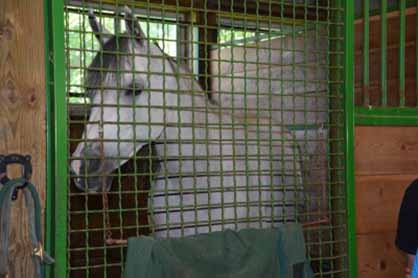Going Home: Biosecurity Tips For After the Horse Show
 Going home: Biosecurity tips for animals that went to the county fair
Going home: Biosecurity tips for animals that went to the county fair
Animals exhibited at the county fair that will return to their home herds pose a significant biosecurity risk to the animals left at home. Follow these steps after the fair has ended to protect everyone.
by: Katie Ockert, Michigan State University Extension
Animals that have been exhibited during the county fair are likely near and dear to their exhibitors’ hearts. After all, they spent countless hours training and preparing their animal for the show at the fair. We protect them from everything before the show season, but do we give enough thought about what happens when they go home? Each time an animal is taken out of its home environment and exhibited, there is a certain amount of risk for exposure to illness.
Michigan State University Extension offers these biosecurity steps exhibitors can take to protect their show animals and those that were left at home after the fair has ended.
- Keep animals that were at the fair separate from animals that were not for 28 – 30 days. If at all possible, do not allow nose-to-nose contact and provide as much distance between animals.
- Disinfect all buckets, feeders, tools and footwear that was at the fair.
- Throw away any feed or hay that was at the fair.
- Always wear clean clothes and footwear. Boot coverings may be helpful when caring for animals.
- Take care of animals that stayed home from the show first, and animals that were at the show second. Do not go back and forth between animals as this increases the risk of cross-contamination.
- Do not eat or drink in the barn.
Observe animals daily for signs and symptoms of illness, such as:
- Obvious pain or discomfort
- Decrease in appetite and water intake
- Fever
- Lethargy
- Diarrhea or changes in consistency in manure
- Discharge from nasal cavity or eyes
- Overall weakness
If you notice any of the above symptoms, please call your veterinarian immediately.
Care of animals after the fair is critical. Exhibited animals were exposed to animals from other farms, fair goers who may not have washed their hands in between various species of animals, and potentially a lot of stress. By following these steps, you can help keep all of your animals safe and healthy.
This article was published by Michigan State University Extension. For more information, visit http://www.msue.msu.edu. To have a digest of information delivered straight to your email inbox, visit http://www.msue.msu.edu/newsletters. To contact an expert in your area, visit http://expert.msue.msu.edu, or call 888-MSUE4MI (888-678-3464).










